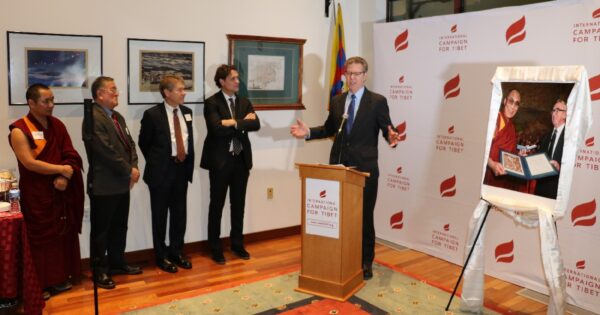On the 25th anniversary of the Panchen Lama’s recognition, a US ambassador said the United States will continue to pressure China to free the Tibetan spiritual leader, whom China has held captive for 25 years.
“This issue continues to be raised by the US government, will continue to be raised by the US government,” Sam Brownback, the ambassador-at-large for international religious freedom, told reporters at a briefing yesterday, May 14, 2020.
That date marked a quarter century since the Dalai Lama recognized Gedhun Choekyi Nyima, a six-year-old boy living in Tibet, as the reincarnated Panchen Lama, one of the most important leaders in Tibetan Buddhism.
Three days later, on May 17, 1995, Chinese authorities kidnapped the child and his parents. No one has seen them in public since.

Ambassador Brownback at an ICT event in December 2019.
Bhuchung K. Tsering, vice president of the International Campaign for Tibet, will discuss the Panchen Lama’s ongoing disappearance this weekend on a virtual panel hosted by the Central Tibetan Administration. The panel will be Sunday—the 25th anniversary of the Panchen Lama’s abduction.
As Brownback noted, the case of the Panchen Lama is gaining renewed interest as China plots to interfere in the eventual reincarnation or succession of the Dalai Lama, who is now 84.
The Tibetan Policy and Support Act, which passed the House of Representatives in January and is gathering momentum in the Senate, will penalize the Chinese government if it names its own Dalai Lama in the future–just as it named its own fake Panchen Lama after it kidnapped Gedhun Choekyi Nyima.
During his briefing—which focused on the impact of COVID-19 on religious minorities—Brownback also criticized China for carrying out a “million police to 10 million homes” campaign in Tibet during the height of a coronavirus lockdown.
Brownback also addressed the role of Chinese official Chen Quanguo in Tibet. Chen has earned international rebuke for orchestrating the mass internment of Uyghurs and other Muslim communities in East Turkestan (known in China as Xinjiang).
As Brownback noted, Chen previously served as the Chinese Communist Party secretary in the Tibet Autonomous Region and developed his model of repression there. Because of Chen and other Chinese leaders, Tibetans today have virtually no religious freedom to speak of.
Below are the Tibet-related parts of Brownback’s briefing.
AMBASSADOR BROWNBACK: In China, we’re seeing a couple of particular faces of this taking place in the religious persecution category in Tibet, towards the Tibetans. Even during the strictest parts of the lockdown, the Chinese Government was conducting a campaign to send a million police to 10 million homes in Tibet to further restrict the Tibetans and Tibetan Buddhism, even during the pandemic. And then also we’re seeing in the Uighur Muslim community they’re facing increase of vulnerabilities as they’re being forced to work despite coronavirus risk, and they’re being further exposed.
[…]
SHAUN TANDON, AFP: Could I follow up? You mentioned Tibet at the beginning. I guess this isn’t directly COVID-related, but if I’m not mistaken, today is the 25th anniversary of the Dalai Lama’s recognition of the Panchen Lama. Do you have any greater clarity on the whereabouts of the Panchen Lama as recognized by the Dalai Lama? Is this still something that you have been raising with China?
AMBASSADOR BROWNBACK: Thanks, Shaun, for the questions. Yes, today is the Panchen Lama recognition. No, we do not have any idea of the whereabouts, and yes, we continue to press the Chinese authorities to release the Panchen Lama and to let him free, but – and, well, let the world know where he is. And this takes on, I think, an increased interest and focus and importance as China continues to assert – the Chinese Communist Party continues to assert their right to appoint the next Dalai Lama, and – which they do not have the right to do.
So this issue continues to be raised by the U.S. Government, will continue to be raised by the U.S. Government. And I think it’s also getting some increased interest, again, in the Congress and in places around the world because of the succession issues and concerns being raised by the Chinese claiming this right which they don’t have. They don’t have the right to appoint the next Dalai Lama any more they don’t have the right to appoint the next pope.
[…]
DAPHNE PSALEDAKIS, REUTERS: Hi, thanks. I wanted to ask if there’s any movement from the U.S. to finally act against the Communist Party chief in Xinjiang over the treatment of the Uighurs and what the holdup is if not.
AMBASSADOR BROWNBACK: Chen Quanguo is somebody that’s familiar to a number of U.S. Government officials and a number of people. And as we – a number of people would say, this is not his first effort at religious oppression. He built the model in Tibet; he perfected it in Xinjiang. He’s been given a huge amount of resources to conduct this campaign against the Uighurs in Xinjiang and the oppression continues in Tibet. He’s – he may be the best in the world at directing these overall sorts of practices towards religious minorities and trying to really just take the faith out of them, take the religion out of the culture altogether.
And I – there continues to be focus and interest of what’s happening and of what he is doing in particular as a politburo member in China, but I can’t articulate any specific actions against him. But it is certainly noticed and the oppression has not declined. It’s even increased, as I’ve noted, what’s taking place in Xinjiang, but more of what I’ve noted taking place even continuing in Tibet.

